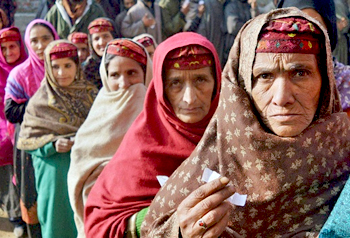 Srinagar, Dec 14: Voting began on a sluggish note this morning in the fourth and the penultimate round of state elections in 18 seats for which 182 candidates, including two chief ministerial aspirants and Speaker of the Jammu and Kashmir Assembly, are in the fray.
Srinagar, Dec 14: Voting began on a sluggish note this morning in the fourth and the penultimate round of state elections in 18 seats for which 182 candidates, including two chief ministerial aspirants and Speaker of the Jammu and Kashmir Assembly, are in the fray.
Over 14.73 lakh voters including 7.05 lakh females are eligible to exercise their franchise at 1,890 polling stations in four districts of the state – Srinagar, Anantnag, Shopian (Kashmir Valley) and Samba (Jammu region).
The voter turnout has generally remained low in the 8 seats of Srinagar, currently being represented by the National Conference (NC), and some parts of Anantnag and Shopian.
Chief Minister Omar Abdullah is contesting from Sonwar Assembly segment of Srinagar after he chose not to contest from his family stronghold of Ganderbal constituency.
Omar was also in fray from Beerwah seat, in central Kashmir's Budgam district, which went to polls in the third phase.
Peoples Democratic Party (PDP) patron and party chief ministerial candidate Mufti Mohammad Sayeed is seeking re-election from Anantnag constituency in south Kashmir.
Depending on the eventual party positions in terms of seats won, either Omar or Sayeed is likely to be the front -runner for the chief minister's post.
Other prominent candidates who are in fray include J&K Assembly Speaker Mubarak Gul, Omar's close confidante Nasir Aslam Wani, Congress ministers Peerzada Mohammad Sayeed and Ghulam Ahmad Mir, and PDP's Abdul Rehman Veeri and Altaf Bukhari.
The campaign in the four districts was by and large peaceful but militants hurled a grenade at a police station in Anantnag town on Thursday, resulting in injuries to three policemen.
The ultras also planted an IED under a culvert in Shopian district on the same day but the explosive was detected by security forces and defused by a bomb disposal squad.
Security arrangements in all the four districts have been strengthened to ensure peaceful polling.
Prime Minister Narendra Modi, BJP president Amit Shah, Union Minister of State Mukhtar Abbas Naqvi, cricketer-turned politician Navjot Singh Sidhu and Bollywood actor and party MP Vinod Khanna campaigned for BJP candidates in the seats going to polls in the fourth phase.
The BJP, which is making its first serious bid for power in Jammu and Kashmir, has come out all guns blazing to make its presence felt in the Valley.
Congress president Sonia Gandhi, Leader of Opposition in Rajya Sabha Ghulam Nabi Azad and Pradesh Congress Committee president Saifuddin Soz also campaigned for their candidates.
Omar, working president of the NC, was the only star campaigner for his party in the absence of his father and former chief minister Farooq Abdullah, who is undergoing medical treatment in London.
Omar crisscrossed the four districts to campaign for his party candidates including himself.
PDP's Sayeed and party president Mehbooba Mufti also campaigned for their party candidates.
Of the 18 seats going to polls today, the ruling NC had won nine in 2008 while the opposition PDP bagged six seats. Congress had won two seats while National Panthers Party clinched the Samba seat in Jammu region.
With the fourth phase, the polling process will come to an end in Kashmir Valley as all the 20 seats going to polls in the fifth and the last phase on December 20 are in Jammu region.






Comments
Add new comment